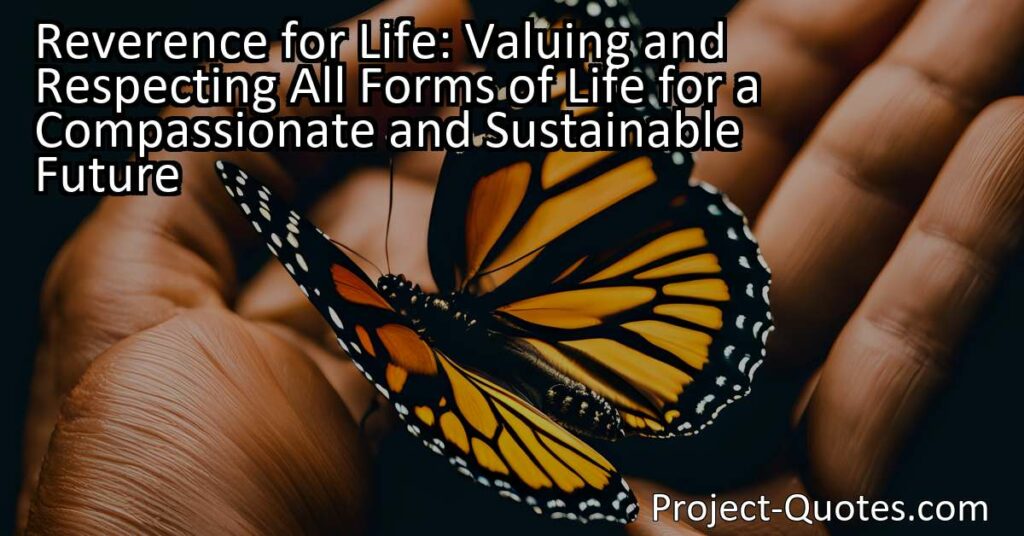Reverence for life affords me my fundamental principle of morality.
Schweitzer, Albert
Reverence for Life: Valuing and Respecting All Forms of Life for a Compassionate and Sustainable Future In a world where conflicts and cruelty are prevalent, cultivating reverence for life becomes vital. This mindset emphasizes valuing and respecting all living beings, promoting compassion and empathy. By extending our reverence to animals, the environment, and creating inclusive societies, we can work towards a more harmonious and sustainable future.
Table of Contents
Meaning of Quote – Reverence for life affords me my fundamental principle of morality.
Reverence for life affords me my fundamental principle of morality. This powerful statement by Albert Schweitzer holds tremendous meaning and provides a profound insight into how we can shape our actions and decisions in life. Reverence for life, at its core, is about valuing and respecting all forms of life on this planet, from human beings to animals, plants, and even the smallest microorganisms. It emphasizes the interconnectedness of all living beings and encourages us to tread on this world with compassion, kindness, and empathy.
In a world where conflicts, violence, and cruelty often dominate headlines, cultivating reverence for life becomes all the more essential. It serves as a guiding principle that can help steer us towards making ethical choices and fostering a more harmonious existence. When we approach life with reverence, we acknowledge the intrinsic worth of every living being, regardless of species, race, or any other differentiating factor. This mindset calls upon us to treat all individuals with dignity and to act in a way that promotes their well-being.
Reverence for life begins with self-reflection and self-awareness. It requires us to recognize our interconnectedness with the world around us and the impact our actions can have on others. By practicing mindfulness, we can cultivate an attitude of gratitude for the beauty and diversity of life that surrounds us. Whether it’s the chirping of birds in the morning or the gentle rustling of leaves in the wind, every moment offers us an opportunity to appreciate the awe-inspiring marvels of nature.
As we extend our reverence beyond ourselves, it becomes important to consider the well-being of other living beings. Animals, for instance, are sentient beings capable of feeling pain, pleasure, and a whole range of emotions. Recognizing their inherent worth, animal rights activists advocate for ethical treatment and an end to the exploitation of animals for human consumption, scientific experimentation, or entertainment. By supporting initiatives that promote cruelty-free alternatives, adopting a plant-based diet, or boycotting industries that harm animals, we can actively live out our reverence for life.
Similarly, our reverence should extend to the environment and the preservation of our planet. Recognizing the finite resources we have and the detrimental effects of climate change, conservation efforts become crucial. By reducing our carbon footprint, supporting sustainable practices, and engaging in environmental activism, we can demonstrate our reverence for life by safeguarding the ecosystems that sustain us and future generations.
Furthermore, reverence for life compels us to consider the social and economic disparities that exist in our world. By acknowledging the humanity in each individual, regardless of their socio-economic status or cultural background, we can work towards creating a more just and inclusive society. This involves advocating for equal access to basic needs such as education, healthcare, and clean water, as well as challenging discriminatory practices that perpetuate injustice.
Reverence for life also plays a role in our interpersonal relationships. It calls us to recognize the dignity of every individual we encounter, treating them with kindness, empathy, and respect. In our schools, workplaces, and communities, we can foster a culture of inclusivity by valuing diversity and appreciating the unique contributions each person brings. This requires actively listening to others, seeking to understand their perspectives, and creating an environment where everyone feels safe and supported.
Ultimately, cultivating reverence for life is a lifelong journey. It requires consistent introspection, open-mindedness, and a willingness to examine our own biases and privileges. It is through this process that we can continually refine our moral compass, ensuring that our actions align with our fundamental principle of valuing all life.
In conclusion, the principle of reverence for life is a guiding light that enables us to navigate the complexities of our world. By embracing the interconnectedness of all living beings and recognizing their inherent worth, we can generate positive change and create a more compassionate and sustainable future. So, let us heed Albert Schweitzer’s words and infuse our lives with a profound reverence for the beautiful tapestry of life that encompasses us all.
I hope this quote inspired image brings you hope and peace. Share it with someone who needs it today!


